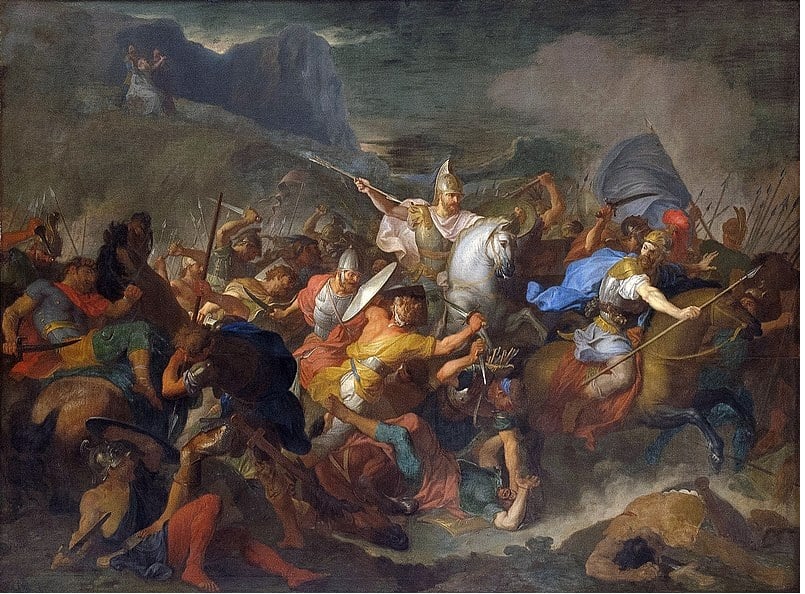In my last post I wrote that God ordered the capital punishment of the inhabitants of the land God had given Israel because they were guilty of depravity and violence. The Canaanites heard of the miraculous approach of the Israelites and knew that Israel’s God was helping them, but some chose to fight rather than flee. As the Canaanite prostitute, Rahab, told Israel’s spies who had entered Jericho:
I know that the LORD has given you the land, and that the terror of you has fallen on us, and that all the inhabitants of the land have melted away before you. For we have heard how the LORD dried up the water of the Red Sea before you when you came out of Egypt, and what you did to the two kings of the Amorites who were beyond the Jordan, to Sihon and Og, whom you utterly destroyed. When we heard it, our hearts melted and no courage remained in any man any longer because of you; for the LORD your God, He is God in heaven above and on earth beneath” (Josh. 2:9-11).
Thus, those who were sensitive to the Lord’s warning had the opportunity to flee but many remained. Skeptics will object, however, that certainly there must have been some adult Canaanites who were innocent of those evils.
The answer to that is simple: there weren’t any innocent adult Canaanites!
That there were some innocent Canaanites living in that area is based on the presumption that surely not everyone would have done these deeds, but that is merely an assertion unsupported by any evidence whatsoever.
Abraham and Sodom and Gomorrah
God knows who will or will not repent and the Canaanite cities of Sodom and Gomorrah serve as an amazing illustration. The Lord tells Abraham that the outcry against Sodom and Gomorrah “is indeed great, and their sin is exceedingly grave.” After the Lord said this Abraham knew the Lord would destroy those cities, so Abraham asked:
Will you sweep away the righteous with the wicked? What if there are fifty righteous people in the city? Will you really sweep it away and not spare the place for the sake of the fifty righteous people in it? Far be it from you to do such a thing—to kill the righteous with the wicked, treating the righteous and the wicked alike. Far be it from you! Will not the Judge of all the earth do right?
Notice Abraham’s plea: “far be it from you to do such a thing—to kill the righteous with the wicked!” In other words, Abraham is worried precisely about the issue of God’s fairness. Abraham is worried precisely over what the skeptics grouse about. How does the Lord respond? The Lord then agrees to spare both cities if there are fifty righteous people.
Abraham then asked the Lord to spare the cities for forty-five righteous people, and the Lord agrees. He then asked about forty, then thirty, then twenty, and finally he asked the Lord to spare both cities if there were only ten righteous people. I suspect that when Abraham said “ten” that he was all but certain that there were at least ten righteous people in those cities! After all, his nephew Lot and his wife and two daughters make four people. All they need to find is six others to spare both cities. And the Lord answers “For the sake of ten, I will not destroy it.” I cannot overstate the significance of this. Abraham asks exactly the same question that many ask: is it fair that God kill the innocent?
In Genesis 19 we learn that after Abraham’s conversation with the Lord, two angels arrive at Sodom and stay in Lot’s house but that evening, the men of the city, “both young and old,” surround the house and demand that Lot send the angels outside so they might have sex with them. Imagine the horror of that moment. The men want to rape Lot’s guests and when he refuses to send them out, they threaten to do worse to him. Even after the angels blind them, “they wore themselves out groping for the door” (v.11).
The next morning, even though the night before many of the people in that city had been blinded, Lot can find no one willing to leave. Also, even though the men of the city tried to rape his guests, Lot is reluctant to leave himself. But the Lord was merciful to Lot so the angels “seized” Lot, his wife, and his two daughters by the hand and brought them out of the city.
And what happens once Lot and his daughters get out of the city? Lot’s daughters get Lot drunk and have sex with him so that they can have children by their father! Even Richard Dawkins, in a surprising moment of moral clarity, writes, “If this dysfunctional family was the best Sodom had to offer by way of morals, some might begin to feel a certain sympathy with God and his judicial brimstone.”1 Frankly, I don’t know how God could make it clearer to us humans that he knows who would or would not repent and that they were all wicked. Really, that’s pretty clear, right? Do we need this passage to be in blinking red neon lights in our Bibles to get the significance of it?
The evil which seduced the people of Sodom and Gomorrah may have surprised Abraham and may surprise us, but it didn’t surprise God. Certainly we learn several things from this passage. One, Sodom and Gomorrah were completely depraved. Two, God knows hearts and therefore knows who will and who won’t repent. Three, God would allow entire cities to live if it meant that a handful of righteous wouldn’t die. Four, God was willing to give evidence of Sodom and Gomorrah’s wickedness so that He couldn’t be accused of killing the righteous with the wicked. And five, when God destroyed these cities, he only killed the wicked.
Jeremiah and Jerusalem
And it’s not just this passage! We see a similar account in Jeremiah. The Lord warned Israel that if they let the Canaanites live that they would be seduced by their sin and then God would do the same thing to Israel. Well, we know that happened, and so the Lord sent prophets to warn them to repent—to no avail. Then the Lord said in Jeremiah 5:1-2: “Go up and down the streets of Jerusalem, look around and consider, search through her squares. If you can find but one person who deals honestly and seeks the truth, I will forgive this city. Although they say, ‘As surely as the Lord lives,’ still they are swearing falsely.” Then in verses 3-5 Jeremiah reports that he looked but that he couldn’t find anyone who would repent. So in v. 6 he concludes: “Therefore a lion from the forest will attack them, a wolf from the desert will ravage them, a leopard will lie in wait near their towns to tear to pieces any who venture out, for their rebellion is great and their backslidings many.” Notice that, just as with Sodom and Gomorrah, the Lord made sure that the world would know that He knows when there are no good people in a city.
Ezekiel and Any Country
Consider also this passage from Ezekiel 14:13-14, “Son of man, when a land sins against me by acting faithlessly, and I stretch out my hand against it and break its supply of bread and send famine upon it, and cut off from it man and beast, even if these three men, Noah, Daniel, and Job, were in it, they would deliver but their own lives by their righteousness, declares the Lord God.” In the following verses the Lord says this is true when He kills with “wild beasts,” or a “sword,” or “pestilence.”
Then in v. 22 the Lord says, “But behold, some survivors will be left in it, sons and daughters who will be brought out; behold, when they come out to you, and you see their ways and their deeds, you will be consoled for the disaster that I have brought upon Jerusalem, for all that I have brought upon it.” Why will the people who witnessed their destruction be consoled by seeing these survivors? In the next verse the Lord tells us: “They will console you, when you see their ways and their deeds, and you shall know that I have not done without cause all that I have done in it, declares the Lord God.” Again, notice that the Lord cares that the people of that day realized that the people He had killed were depraved and deserved to die.
Bottom line: based on the above, we have no reason to believe that there was even one non-wicked person living among the Canaanites who remained in the land when Israel came to drive them out. But question remain, what about the killing of the animals and children? We will examine these issues in the next four posts.
- Richard Dawkins, The God Delusion (Boston: Houghton Mifflin, 2006), 240. [↩]


Pingback: Were There Any Innocent Canaanites? | The Apologetics Minion
Hi Clay! You have brought up key points in understanding not only the Biblical text, but the condition of mankind when unrepentant. Hearts harden—wills are stubborn. People don’t want to submit to authority, or recognize God is “the” authority, and willfully go their own way. Today, it’s easy to see similar conditions in humanity. We don’t like calling ourselves “sinners” because we’ve been indoctrinated in the self-esteem movement, where everyone is a winner! Truly, we have lost connection with what holiness means, and what is required of us. It is humbling to admit that our sinful natures are bent on selfishness. There is truly nothing new under the sun. (Ecc. 1:9)
Does history say the Canaanites were guilty of child sacrifice, temple prostitution and
what other crimes?
I read your excellent apologetic last night. So was their life being cut short due to STD anyway? What would you recommend as texts for a state college in ethics or apologetics?
Pingback: Why Kill the Canaanite's Animals?
Clay, Thank you for your insight here. I’m also wondering what you think of the theory that some of the Canaanites were genetically corrupt due to demonic genetic manipulation. I’m referring to the giant Anikim, Nephilim, and others referred to in the text, initially in Gen. 6 where the “Sons of God” “went into the daughters of men.” This is just prior to Noah’s flood, but the giants are also referenced in Canaan after the flood. One theory says that demons took possession of men and corrupted their “seed” genetically, producing giants and political and moral chaos. It’s a bizarre theory, but it explains a lot.
The demon thing is too speculative for me, Tony. Also, I just think this is what humans do when they decide to worship another god. They don’t need demon encouragement.